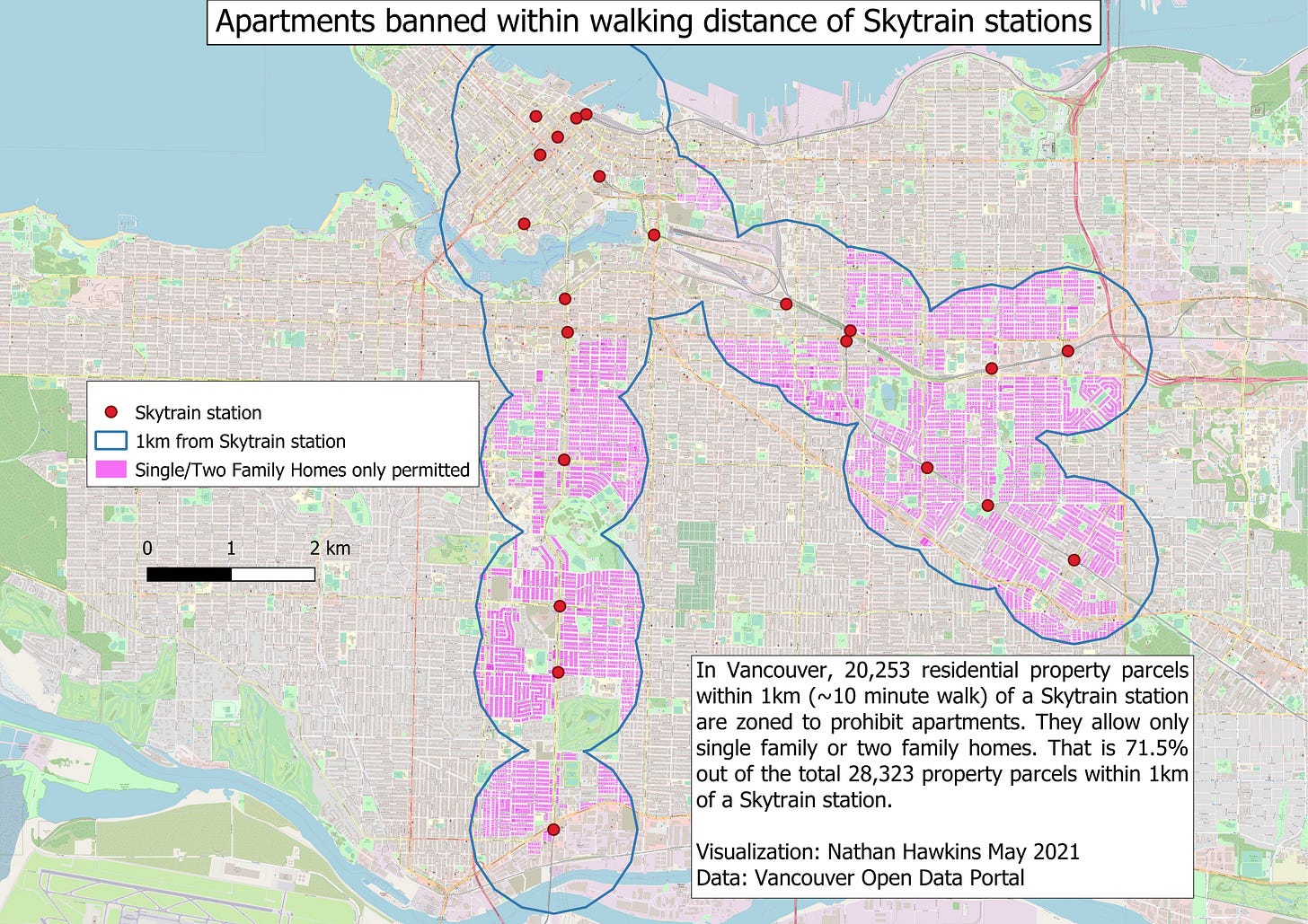BC's transit-oriented development policy
Allowing high-rises near rapid transit stations and bus exchanges
Transit-oriented development
Press release and backgrounder.
Why high-rises? Why not just build low-rises throughout the city?
There's plenty of people who want to live close to work, trading space for time. Then they can get around by taking transit, walking, or biking, instead of living further out and spending more time driving to and from work.
When you have a lot of people who want to live at a particular location, land prices go up. Allowing more height and density at that location allows households to economize on expensive land.
BC announced its transit-oriented development policy yesterday. It basically says that within 800 m of a rapid transit station (a 10-minute walk), municipalities will be required to allow eight storeys; within 400 m, 12 storeys; within 200 m, 20 storeys. Within 400 m of a designated bus exchange, eight storeys will be allowed in Metro Vancouver (12 storeys within 200 m), six storeys in medium-sized municipalities (10 storeys within 200 m).
Also: no parking minimums, which helps to reduce costs and make more projects viable.
The estimate is that this will result in about 100,000 additional homes over 10 years.
Municipalities will be required to update their Official Community Plans to reflect these changes. In addition, municipalities will no longer hold a public hearing for projects which comply with the OCP - this is part of Bill 44 on Small-Scale Multi-Unit projects.
SkyTrain stations and bus exchanges, as identified by TransLink:
Fixed development charges
Press release and backgrounder.
Right now there's supposedly voluntary contributions ("Community Amenity Contributions") which are negotiated during a spot rezoning.
On Tuesday, the province brought in legislation to say that these charges must be fixed, not negotiated. This should be simpler, faster, and more transparent than negotiation.
The press release says:
Bill 44 [the Small-Scale Multi-Unit bill] allows upfront zoning, which will facilitate an increase in housing supply in communities throughout B.C. The legislation will require local governments to shift their planning process to an up-front framework, pre-zone land to meet their housing needs and reduce the use of current rezoning processes.
As local governments shift to more upfront planning and zoning, the proposed legislation [Bill 46] provides high-growth communities with a more efficient and transparent development-finance tool called an amenity cost charge (or ACC). Instead of amenity costs and agreements coming together during the rezoning stage, this tool is part of the upfront planning process, giving builders and municipalities a better, clearer and more transparent understanding of costs associated with a housing project from the start.
There's still a danger that municipalities may set these charges too high; but my understanding is that they need to be approved by the province.
Legislation
Small-Scale Multi-Unit (Bill 44)
https://www.bclaws.gov.bc.ca/civix/document/id/bills/billscurrent/4th42nd:gov44-1
Development charges (Bill 46)
https://www.bclaws.gov.bc.ca/civix/document/id/bills/billscurrent/4th42nd:gov46-1
Transit-oriented areas (Bill 47)
https://www.bclaws.gov.bc.ca/civix/document/id/bills/billscurrent/4th42nd:gov47-1
More
Transit-oriented development
BC government to allow high-rise residential towers up to 20 storeys near all SkyTrain stations, and up to 12 storeys near bus exchanges. Kenneth Chan, Daily Hive.
B.C. government introduces bill encouraging creation of more housing near transit hubs. CBC.
B.C. housing density legislation focuses on new builds near transit hubs. Hana Mae Nassar and Cole Schisler, CityNews.
Development charges
BC government overhauls fees paid by developers to all cities, including CACs. Kenneth Chan, Daily Hive.
B.C. NDP proposes overhaul of the way municipalities collect fees from developers. Katie DeRosa, Vancouver Sun.
Changes promise to cut B.C. development negotiations, provide certainty. Wolf Depner, Prince Rupert Northern View.
B.C. introduces changes to municipal development amenity and infrastructure fees. Liza Yuzda and Charlie Carey, CityNews.




Hey Russil, thanks for the article about this. I'm most curious about the phrasing in the official press release: "This legislation, if passed, will build on work underway to facilitate more transit-oriented development, create more livable communities and tackle the housing crisis."
In your view, is there a chance that the legislation won't be passed? Or that it may be watered down? I'm not familiar with provincial politics.
Also wondering whether you have some thoughts on the 100k unit in 10 years projections. Just eyeballing it, it feel like the plan could support A LOT more as is. Is the projections too conservative? Maybe they assume the development charge will be high which deter developer?